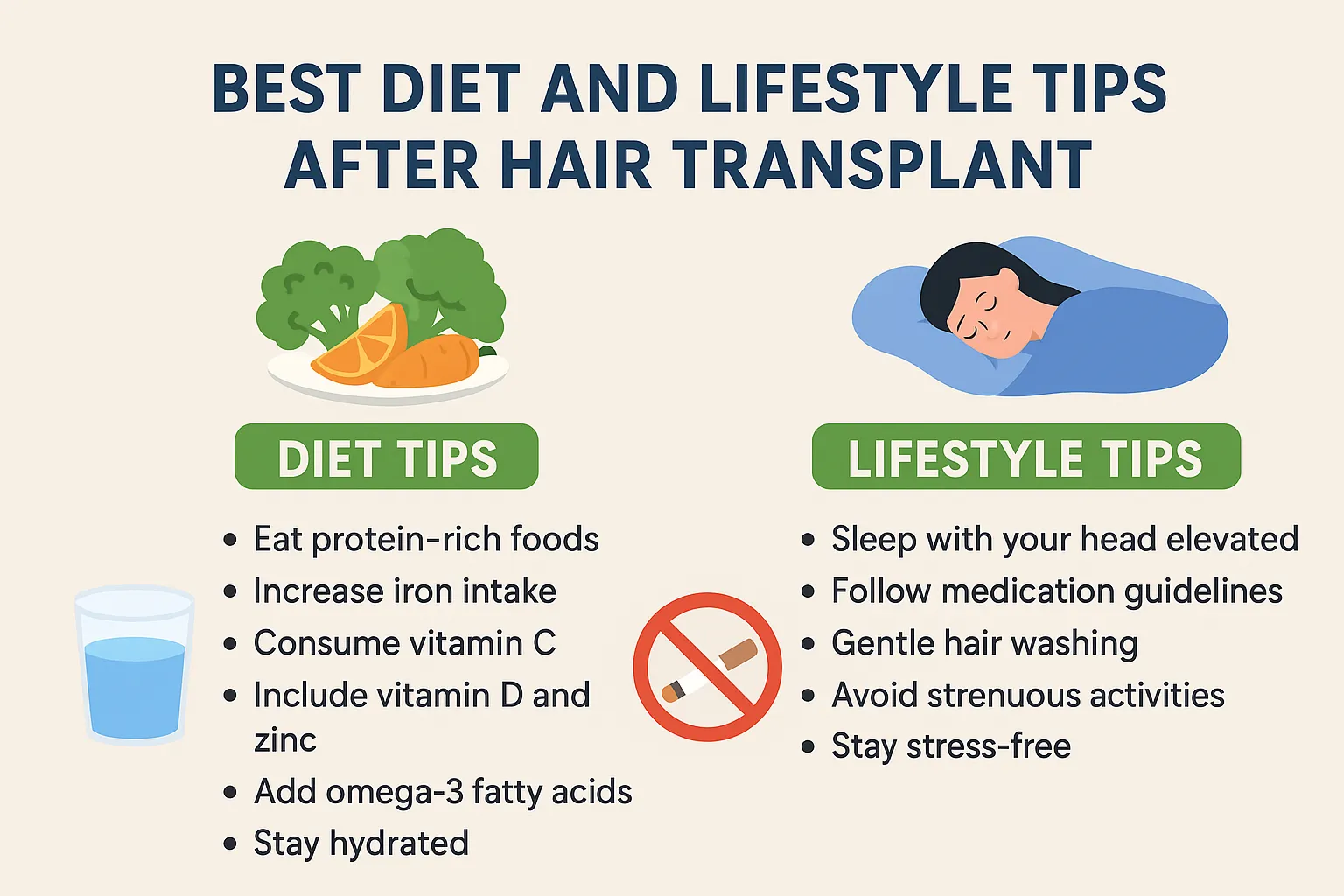Introduction
Hair treatment aftercare is critical for achieving the best results from your procedure, restoring both hair and confidence. Proper post-transplant care, including diet and lifestyle choices, promotes faster healing and stronger hair growth. This guide for 2025-26 outlines essential tips to optimize your hair restoration recovery.
For details on the procedure itself, explore our Hair Transplant in Turkey 2025-26 guide.

Why Diet is Crucial for Post-Transplant Care
Effective hair treatment aftercare relies on proper nutrition to support newly transplanted follicles. A nutrient-rich diet enhances:
- Rapid scalp healing for better recovery.
- Robust hair growth for lasting results.
- Reduced risk of infection through stronger immunity.
- Overall health to support hair restoration recovery.
Discover more about nutrition’s role in our High Protein Foods guide.
Best Diet for Hair Restoration Recovery
1. Protein-Rich Foods for Post-Transplant Care
Hair, made of keratin, requires ample protein for optimal growth during hair treatment aftercare.
- Eggs, chicken, fish, lean meats.
- Legumes, beans, lentils, tofu for plant-based diets.
2. Iron-Rich Foods for Hair Growth
Iron supports hair restoration recovery by preventing slowed growth.
- Spinach, kale, beetroot.
- Red meat, liver, pumpkin seeds.
3. Vitamin C for Scalp Health
Vitamin C boosts collagen and aids iron absorption, key for post-transplant care.
- Oranges, strawberries, kiwi.
- Bell peppers, broccoli.
4. Vitamin D & Zinc for Follicle Strength
These nutrients reduce shedding and promote follicle health in hair transplant aftercare.
- Salmon, tuna, egg yolks.
- Nuts, seeds, chickpeas.
5. Omega-3 Fatty Acids for Hair Thickness
Omega-3s enhance scalp health and hair density during recovery.
- Walnuts, flaxseeds, chia seeds.
- Fatty fish like mackerel and sardines.
6. Hydration for Optimal Recovery
Drink 2–3 liters of water daily to maintain scalp and body hydration for effective hair restoration recovery.
Explore natural remedies in our Natural Hair Growth Treatments guide.
Lifestyle Tips for Optimal Hair Transplant Recovery
✔ Do’s for Post-Transplant Care
- Elevate your head while sleeping to minimize swelling during hair transplant aftercare.
- Adhere to your doctor’s medication plan, including antibiotics and pain relief.
- Gently wash hair after 3–5 days, following clinic guidelines.
- Wear loose hats to shield from dust and sunlight, if advised.
- Manage stress, as cortisol can hinder hair restoration recovery.
❌ Don’ts for Hair Transplant Aftercare
- Avoid smoking and alcohol for 2–3 weeks, as they impede healing.
- Refrain from strenuous exercise, swimming, or gym workouts for 2–3 weeks.
- Keep your scalp away from direct sunlight during the initial hair transplant recovery phase.
- Avoid touching or scratching grafts to prevent dislodging follicles.
- Steer clear of fast food and sugary drinks, which slow recovery.
Learn about biotech advancements in our Biotechnology Breakthroughs guide.
Sample Diet Chart for Post-Transplant Care
This one-week diet plan supports hair transplant aftercare with nutrient-rich meals.
| Day | Breakfast | Lunch | Dinner | Snacks/Extras |
|---|---|---|---|---|
| Day 1 | Oatmeal + fruits | Grilled chicken + salad | Fish + steamed veggies | Nuts + green tea |
| Day 2 | Boiled eggs + spinach | Lentil soup + brown rice | Chicken curry + quinoa | Yogurt + berries |
| Day 3 | Smoothie (banana + flaxseeds) | Grilled salmon + veggies | Tofu stir-fry + rice | Pumpkin seeds |
| Day 4 | Whole grain toast + avocado | Chickpea curry + rice | Paneer + spinach | Fresh orange juice |
| Day 5 | Scrambled eggs | Turkey wrap + salad | Grilled fish + broccoli | Almonds + apple |
| Day 6 | Protein shake + nuts | Vegetable soup + chicken | Egg curry + brown rice | Fresh fruit |
| Day 7 | Omelet + tomato juice | Lentil stew + salad | Salmon + quinoa | Green tea + walnuts |
FAQs
How long should I follow a specific diet for hair transplant aftercare?
Maintain a nutrient-rich diet for 3–6 months for optimal hair restoration recovery, and continue healthy eating long-term.
Can I drink coffee during post-transplant care?
Avoid coffee for the first 2–3 days, as caffeine may increase bleeding and slow healing.
When can I resume exercise after a hair transplant?
Light walking can start after 1 week, but avoid intense workouts for 2–3 weeks during hair transplant recovery.
Do supplements aid hair restoration recovery?
Biotin, zinc, and vitamin D may support hair growth, but consult your surgeon before use.
Is alcohol harmful during hair traetment aftercare?
Yes, alcohol slows recovery and may interfere with medications. Avoid for at least 2–3 weeks.
Conclusion
Hair transplant aftercare in 2025-26 is vital for maximizing results. A balanced diet and careful lifestyle choices promote faster healing and robust hair growth. For more on procedures, visit our Hair Transplant in Turkey guide or explore Healthline’s Guide to Hair Growth for additional hair restoration recovery tips.


